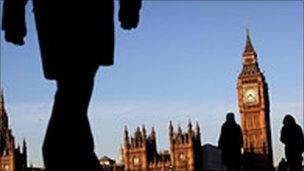Northern Ireland parties divided on electoral reform
- Published

Plans to change the voting system for Westminster elections and to have fewer MPs have been debated in Parliament.
The move is part of a Bill that helped form the Coalition government last May, but political parties in NI are divided over whether change is necessary.
DUP deputy leader Nigel Dodds said the bill was being "rammed through" and there was no mandate for it.
SDLP MP Mark Durkan backed plans to change the voting system, but was concerned about boundary changes.
The Bill passed its initial Commons stage by 328 votes to 269 - a majority of 59.
Earlier, Sinn Fein and the Ulster Unionists said they would examine the proposals, while the Alliance Party backed the reform.
The proposals mean the current 'first past the post' system would be replaced by the alternative vote system
In AV, voters rank candidates in order of preference. But Northern Ireland could lose up to three parliamentary seats as a result of boundary changes.
Pacts
Speaking before the debate started, Alliance MP Naomi Long said there were strong arguments for changing the voting system.
"I think the big advantage of the introduction of AV for Westminster elections is it removes this tendency to drive elections in the direction for example of unionist and nationalist pacts.
"People know they have this second vote which will also count if their first choice person is not elected. I think that is hugely important."
Deputy Prime Minister Nick Clegg unveiled the plans in July.
In a statement which included plans for fixed-term parliaments, he said UK democracy was "fractured", with some votes counting more than others.
Mr Clegg confirmed the government planned to introduce legislation for five-year fixed term parliaments and to hold a referendum next May on changing the Westminster voting system from first-past-the-post to the AV.
If plans get through Parliament, it would mean the next general election would be held on 7 May 2015 and the number of MPs would be reduced by 50 to 600.
The Boundary Commission would be asked to redraw the constituency map, so each has roughly the same number of voters, by the end of 2013 - allowing new constituencies to be used in the 2015 general election.
- Published7 September 2010
- Published25 August 2010
- Published27 July 2010
- Published22 July 2010